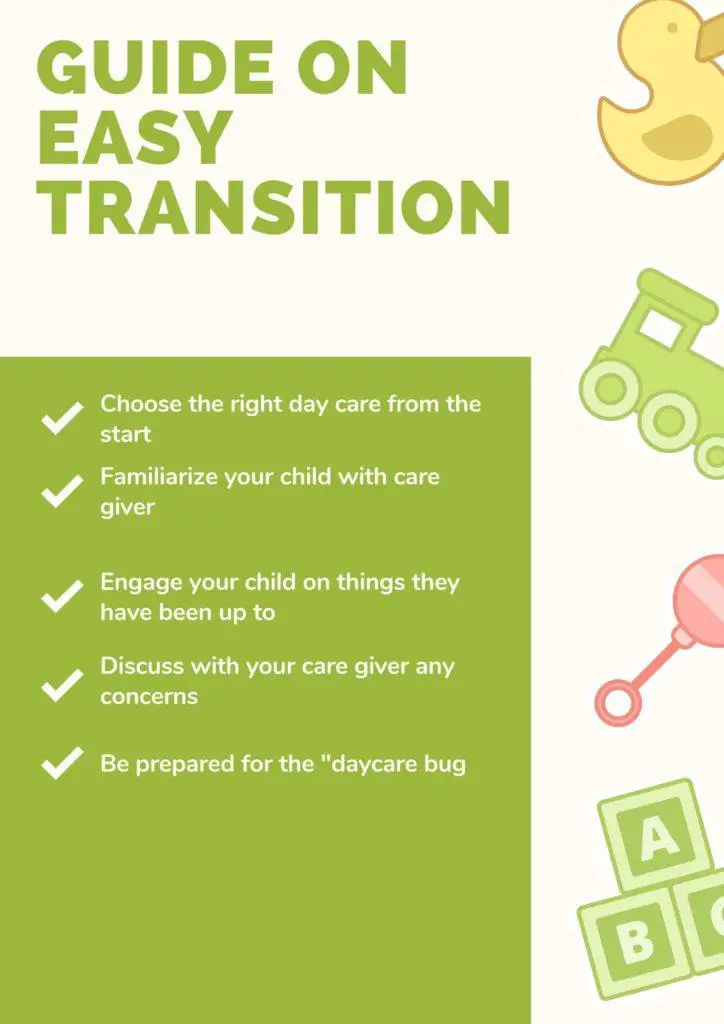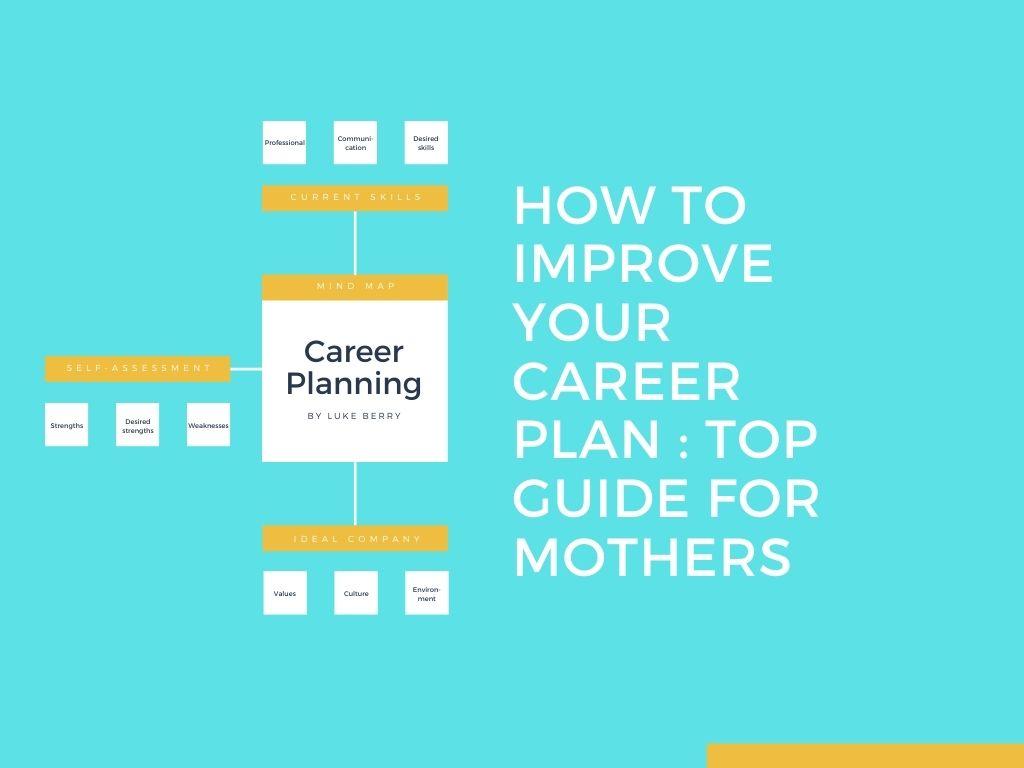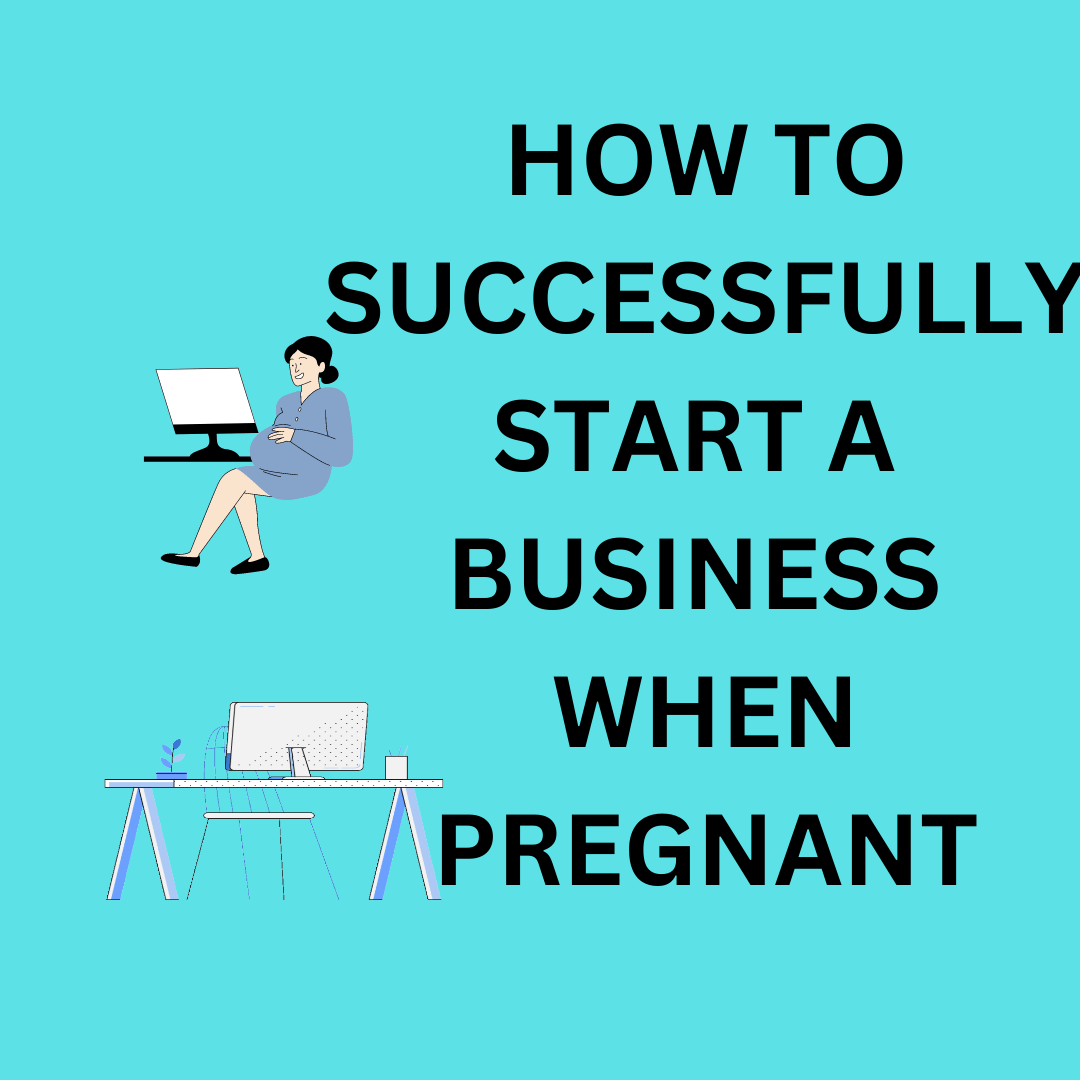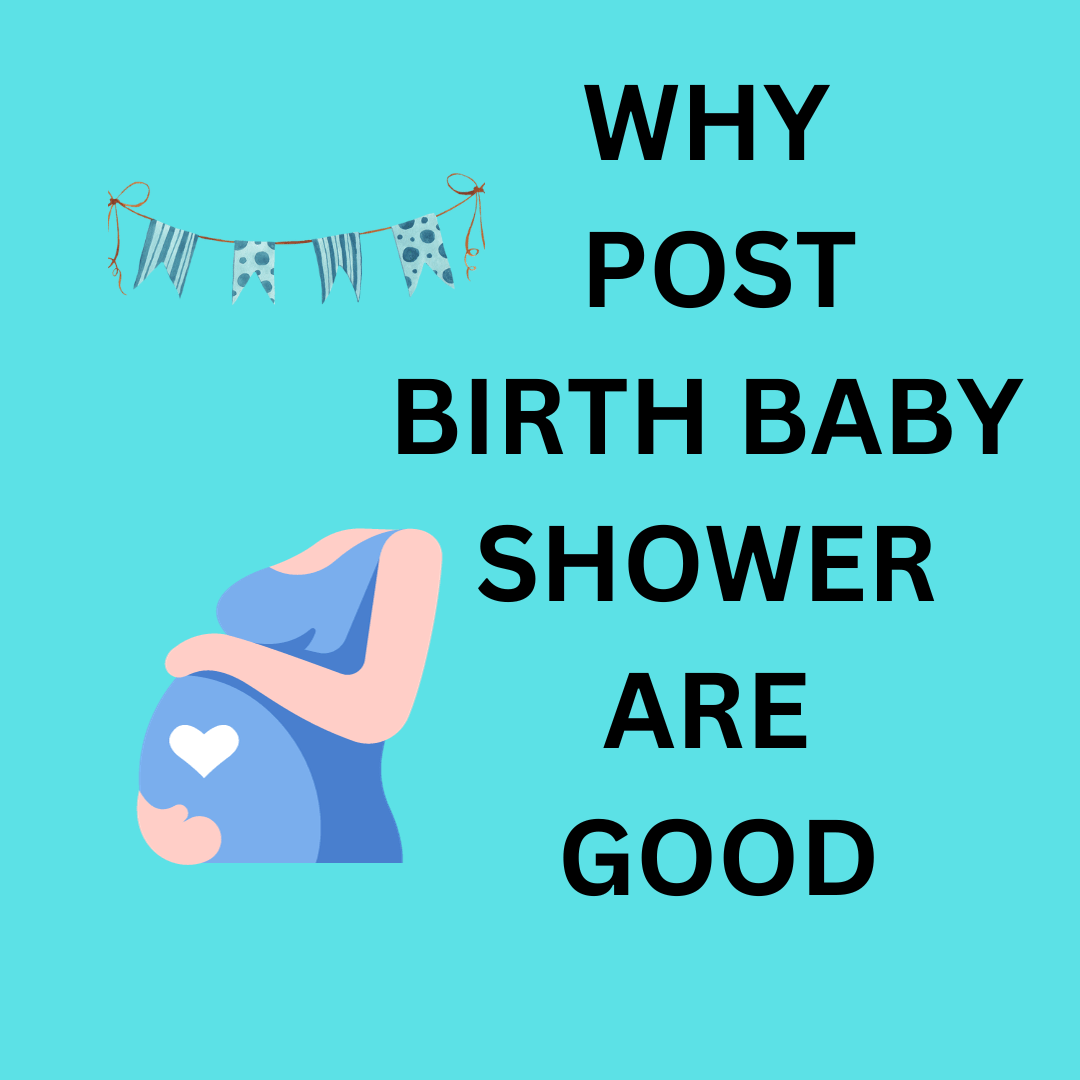Daycares are popular for being available and accommodative of each child’s need, even for babies as young as 3 months old. However it is important that the kids are able to make this transition as smooth and fast as possible.
Some things to expect during the transition period includes a lot of crying, poor feeding, poor napping at home, and you feeling tense and guilt for taking the baby to daycare.
You can make the daycare transition easy and fast for your toddler by choosing the right daycare, doing a pre-introduction, focusing on engaging activities, discussing your concerns with the daycare, being proactive and avoiding to compare the transition with other kids.
Some signs that you baby is not adjusting well into daycare includes crying, mood changes, poor feedback from the daycare, extreme changes in feeding & sleeping and other behavioral changes.
If you notice that your child has challenges in adjusting to daycare, you can practice care with your family & friends, liase & collaborate with your daycare, be consistent with your care schedule and check how you behave around daycare.
The benefits of a smooth and easy transition period includes outgrowing their separation anxiety, improving their social & communication skills, and having less behavioral problems.

What to Expect During Transition to Daycare
The transition period is the period it takes your child (and you) to adjust to the new routine coming from the previous plan to daycare. During this period there may a lot of tension and turbulences related to the change of care plans.
Your child should adjust and settle into the new routine in a little over a week or so. It may take longer for some children than others which should not be a concern.
Some of the things to expect as your baby transitions into daycare include;
- A lot of crying during drop off and pick up
- Poor feeding initially after your toddler joins daycare
- Poor napping at home for a while
- Tensions and guilt on your part for taking baby to daycare
Read : Things you need to Know Before Starting Daycare
How to Help Baby Transition to Daycare Quickly & Easily
1. Choose the Right Daycare
To make it easier for your baby to adjust the move from home based care to daycare, choose the right day care center that fits both your needs. Consider any special needs your baby may such as allergies and how the center will help manage it.
Research and look around till you narrow down on the best center that you can get. It eases your mind while you are away that your child needs are being met. Also it helps make your child comfortable in daycare, hence lessening and shortening the transition period.
Read: Questions to Ask During Daycare Tour
2. Do a Daycare Pre-Introduction
Focus on familiarizing your child with her/his caregiver for the first few days. Preparing your baby for daycare should involve some aspects of what to expect at daycare because it helps them transition smoothly into daycare.
This can be done by getting extra time for them without other kids. For instance try dropping off your baby some minutes before the actual time for everyone. This gives you child some time with caregiver to familiarize, bond and relax.
By doing so, the move into daycare will only take a few days compared to a longer period when this pre-introduction is skipped. The approach works for all babies even as old as 1, 2 or 3 years old.
3. Focus on Engaging Activities
If your child is old enough, engage them on things they have been up to at the daycare. They may call it school or any other name. Let them share about their day, socialization and interactions with other kids.
They may even have done some learning activities and fun stuff that they will be excited to share with you. Discussing this will make your child comfortable and help them adjust faster and transition smoothly.
Also during drop off, trying easing your child into the new day. Tell them they are going to meet so and so, play with so and so, do such and such activities and snack on this and this. Set the mood and your baby will start looking forward to the drop off and staying at the day care center that day.
It prepares them too into what to expect for the day and helps help transition to the daycare settings. Also the stability and predictability of the routine plays a key role in making your child comfortable in daycare.
Read: How to Make Daycare Drop-Off’s and Pick Up’s Easy
4. Discuss Concerns with Daycare Caregivers
Discuss with your care giver any concerns you may have for your child well in advance during the engagement period. Talk about areas or issues that you would like to be considered such as feeding or napping that are usually crucial for an easy transition into daycare.
Having your concerns known upfront allows your caregiver to accommodate them. For instance you may be particularly worried about feeding and napping especially if your child is too young such as as three months old.
Read: How to Build Trust with your Childcare Provider
5. Trust the Daycare
Trusting your caregivers is very important to help you and your baby adjust to the routine of the daycare. Generally babies do better at daycare away from parents. This new routine should be a relief to you as caregivers at daycare centers are trained in early childhood development.
6. Act Proactively to Help Baby Adjust Faster
Be prepared for the dreaded “daycare bug”. Enhance your kid’s immunity through breastfeeding for younger babies and appropriate feeding and vitamins for older ones.
It is important during the transition period from home based care to daycare that you are armed with handling this menace. With so many kids around, a lot of bugs are floating at the center. Most catch it and your kid may catch one too, more especially so during their transition period.
7. Avoid Comparing with Other kids Adjustment
Don’t compare how your child is doing or transitioning with other kid’s, even if you joined day care at the same time. Avoiding comparison will make the transition period less stressful.
Remember that every child is different and unique hence has different ways of adjusting. Treat your case as different and give the best you can to help in the transition. Focus on making their experience at daycare more comfortable instead and they will adjust at their own time.

Signs of your Child is Adjusting Poorly to Daycare
- Unnecessary fussiness during drop off- You child may cry unnecessarily when you are dropping them off, indicating she/he has not transitioned well into daycare
- Generally being unhappy during drop off and pick up
- Poor adjustment feedback from the caregiver. If the daycare has discussed their concerns about your child, you may need to address why the kid is poorly transitioning into daycare.
- Reversal cycling (if baby is still nursing) shows their daycare transition is challenging
- Extreme changes in sleep and feeding behaviors- a challenging transition period may affect how you child ears and naps, both at daycare and home.
- Any other behavioral issue such as extra attachment may indicate that the baby has not adjusted yet to daycare
What to Do if Baby has not Adjusted to Daycare
The transition period can take as short time as few days as along as a month. If it stretches too long with no noticeable improvement, then you need to reconsider some elements. Some things you can do are:
1. Practice the Transition with Family
If your child is having difficulties adjusting to daycare, practice the transition with other family member or friends etc. For instance try leaving them for a few hours with a friend or relative and see how they get along. Doing so helps ease tension and make the babies comfortable being in care of other people.
2. Collaborate with Daycare
Accommodate your caregivers and be willing to do what is required of you to make their job easier. Chat with them and learn about their job. But allow your caregiver to do her job. Discuss your needs and leave the rest to the center.
Also treat them like part of your family to build confidence in your child. If the child can start trusting the care givers, it will improve their transition.
3. Check your Behavior Around Daycare
You may be contributing to your child poor adjustment to daycare with your behavior. If you have to cry, do it after the drop off. Lots of babies seeing their parents cry and nervous, scared, or upset, and interpret it to mean that the situation isn’t safe.
Even at three months old your child can tell all is not well. As a result it makes their adjustment challenging.
Be confident and happy while dropping them off and they will feel much safer. Don’t drag the goodbyes as it makes it harder for both of you and that drags out the transition period. Have a goodbye tradition such a hug or a kiss and that should be it. Don’t overdo it or linger around unnecessarily.
4. Be Consistent in Childcare Arrangement
Be consistent in your care schedule at the daycare. If for instance its 2 days with you, then 5 days at daycare , stick to that. It will help your child adjust to the newly introduced stability of the daycare faster in a few days. It’s easier for them to understand the routine if it’s consistent every week.

How a Smooth Daycare Transition Benefits your Child
1. Outgrowing Separation Anxiety
By transitioning into daycare center your child will outgrow separation anxiety and develop an independence from you. If your child is too small to have separation anxiety say at 3 months old, they will have adjusted to daycare routine by the time they are old enough to have it.
2. Smooth Transition Improve Social Skills
Because of now spending more time with other kids of a similar age, they become more relational and develop better social skills.
3. Improves Communication Skills
Kids as they transition into daycare develop in other areas such as communication and motor skills from interacting and spending time with other children.
4. Less Behavioural Issues
You will note that the transition fuss or other behavioral issues shown by children who spend too much time with their parents dissipates and is finally eliminated.
5. Easy Transition into Formal Education System
Lastly a smooth transition into day-care will help your child transition easily into the formal education system later.



